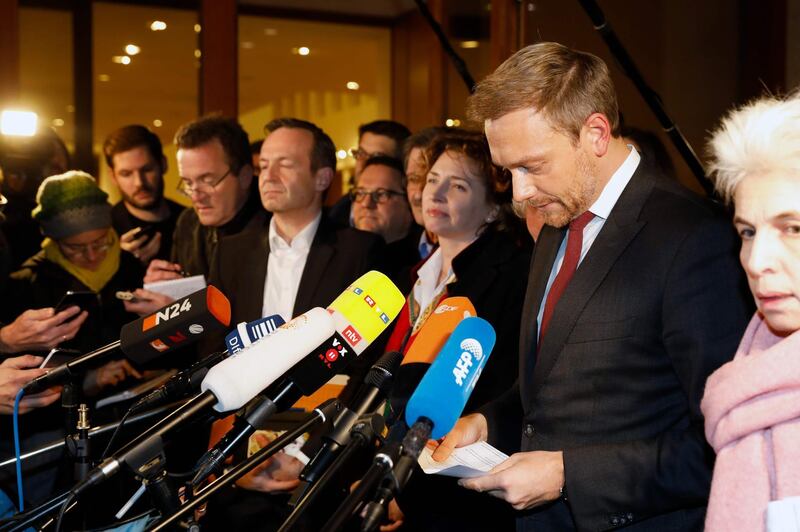Talks on forming German Chancellor Angela Merkel’s next government have collapsed, throwing the future of Europe’s longest-serving leader into doubt and potentially pointing the world’s fourth-biggest economy toward new elections.
After a 12-hour negotiating session that ended shortly before midnight Sunday, the pro-business Free Democratic Party walked out, saying differences with the environmentalist Green party were too great to bridge. Ms Merkel has tried for a month to enlist the two smaller parties for her fourth-term coalition.
"Today there was no progress but rather there were setbacks because targeted compromises were questioned," FDP leader Christian Lindner told reporters. “It’s better not to govern than to govern badly.”
No further coalition talks were scheduled, he added. There was no immediate comment from Ms Merkel.
Party chiefs had initially set 1700 GMT on Sunday as the moment of truth, but the deadline went by without a breakthrough - the second overtime after already missing a previous target on Thursday.
As discussion dragged into the night, Bild daily said on its website that "failure is in the air", while other German media were speculating that parties may call time-out to reflect on their options.
_______________
Read more:
[ Merkel warned of European stability risk as coalition talks drag on ]
[ Merkel seeks partners in a Germany riven by division ]
_______________
After 12 years in office that made her Europe’s anchor of stability in times of crisis, Ms Merkel failed to stitch together an alliance that’s never been tried at the national level. While the breakdown leaves Ms Merkel in charge in a caretaker role, her options for staying in power for another four years have dramatically narrowed.
Possibilities include setting up a minority government headed by her Christian Democratic-led bloc or asking Germany’s president to order a national election just months after the last one in September. Both scenarios would be uncharted territory for Germany, which has had only eight chancellors in the seven decades since World War II.
The upshot is that Europe’s dominant country remains hamstrung on the global stage, potentially affecting everything from policy toward the European Union, Turkey and Russia to government spending and cuts in carbon emissions. Ms Merkel already has made it clear that Germany’s euro-area policy is on hold until there’s a new government.
The coalition talks had been plagued by disagreements from the outset, with immigration, climate and energy emerging as the key sticking points.
Mr Lindner said the draft agreement to enter into formal coalition talks was riddled with “countless contradictions,” prompting his party to walk out.
That failure reflects the fallout from Germany’s last election, which saw the anti-immigration Alternative for Germany party enter parliament with 12.6 per cent of the vote while Ms Merkel’s bloc declined to its lowest share since 1949.
Many former voters of the CDU and its Bavarian CSU sister party switched allegiance to Alternative for Germany, which ran against the political establishment and Ms Merkel’s liberal asylum policy in particular. During last summer’s election campaign, the Chancellor defended her open-borders stance during Europe’s refugee crisis in 2015 and 2016, saying she’s convinced she did the right thing.
Ms Merkel could still turn for support to the Social Democratic Party, the junior partner in her last government since 2013, though SPD leaders have insisted they aren’t interested in another alliance after the party fell to its worst electoral defeat since World War II in September.







